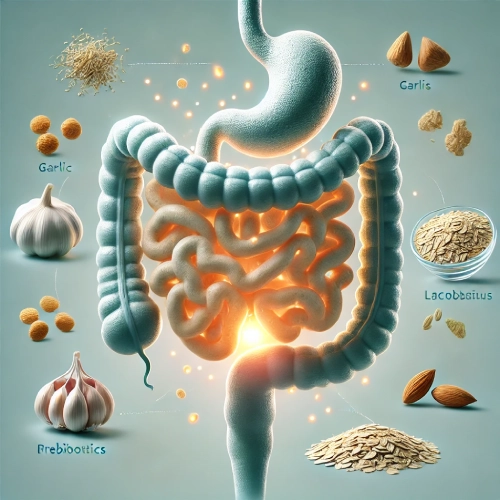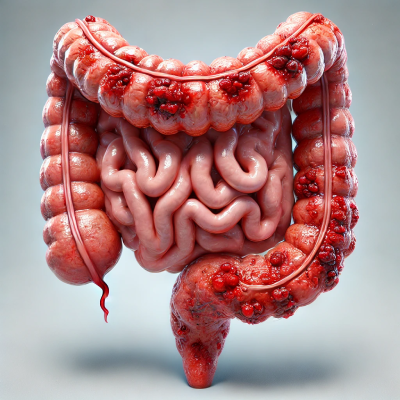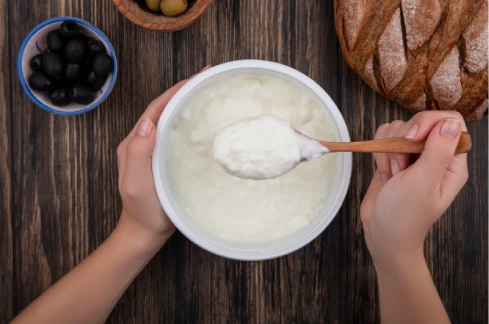Prebiotic Foods and Their Impact on Gut Health
Prebiotic foods have attracted attention for their ability to promote the growth of beneficial gut bacteria. These non-digestible compounds help regulate the gut microbiome, improving digestion and even influencing other aspects of health.
What Are Prebiotic Foods?
Prebiotics are dietary compounds that resist digestion in the small intestine and reach the colon intact, where they are fermented by intestinal bacteria.
Their main function is to stimulate the growth and activity of beneficial bacteria such as Bifidobacterium and Lactobacillus, promoting a balanced intestinal microbiome.
Unlike probiotics, which are live bacteria, prebiotics serve as food for these beneficial microbes, enhancing their growth and activity.
Natural Sources of Prebiotic Foods
Prebiotics are naturally present in a variety of plant-based foods. Some of the best sources include:
- Almonds
- Artichokes
- Barley
- Chia seeds
- Chicory root
- Dandelion greens
- Flaxseeds
- Garlic
- Oats
- Green banana
- Asparagus
- Fruits: apple, pear, lemon, orange, strawberries
These foods contain compounds like fructans and galactooligosaccharides, which promote a healthy gut microbiome. Including them in your daily diet is an effective way to support digestive and overall health.
How to Add More Prebiotic Foods to Your Diet
Increasing your intake of prebiotic foods can be easy with a few simple changes. For example:
- Try adding oats to your breakfast, sprinkling chia or flaxseeds into smoothies and yogurt, or using garlic and onions in everyday meals.
- Combining prebiotics with probiotic-rich foods like kefir or yogurt can further enhance gut health by creating a more balanced microbiome.
- Another effective strategy is choosing whole grains over refined grains, as they typically contain more prebiotic fiber. Additionally, consuming root vegetables and legumes regularly can help boost your prebiotic intake naturally.

Conclusion
Prebiotic foods play a vital role in promoting gut and overall health. By stimulating the growth of beneficial bacteria and contributing to the production of key metabolites, their consumption is linked to various physiological benefits.
Incorporating natural sources of prebiotics into your daily diet can improve digestion, strengthen the immune system, and support metabolic balance.
A well-rounded diet rich in prebiotics is an essential strategy for maintaining long-term health and well-being.
Written by: Nutritionist Andrés Izurieta
Bibliographic citations:
Yoo S, Jung SC, Kwak K, Kim JS. The Role of Prebiotics in Modulating Gut Microbiota: Implications for Human Health. Int J Mol Sci. 29 de abril de 2024;25(9):4834.
Bedu-Ferrari C, Biscarrat P, Langella P, Cherbuy C. Prebiotics and the Human Gut Microbiota: From Breakdown Mechanisms to the Impact on Metabolic Health. Nutrients. 17 de mayo de 2022;14(10):2096.
Singarayar MS, Chandrasekaran A, Balasundaram D, Veerasamy V, Neethirajan V, Thilagar S. Prebiotics: Comprehensive analysis of sources, structural characteristics and mechanistic roles in disease regulation. Microb Pathog. diciembre de 2024;197:107071.
Kaur AP, Bhardwaj S, Dhanjal DS, Nepovimova E, Cruz-Martins N, Kuča K, et al. Plant Prebiotics and Their Role in the Amelioration of Diseases. Biomolecules. 16 de marzo de 2021;11(3):440.



